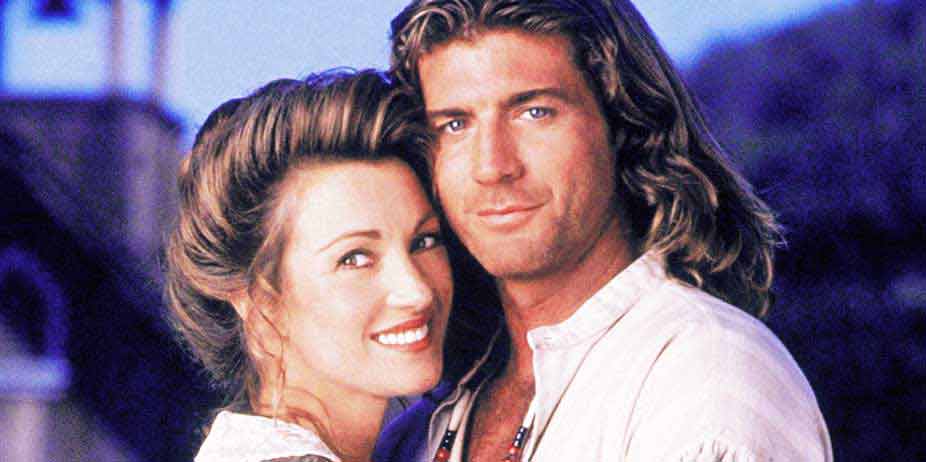Doctor Quinn, Medicine Woman, Season Two (1994)
The second year of the surprise hit Doctor Quinn, Medicine Woman is not my favorite of the six seasons, but it does provide some exciting storylines and we do get to see the relationship between the romantic leads develop, so it is a welcome addition to any collection.
Most of the men of Colorado Springs have come to accept the fact that Michaela Quinn (Jane Seymour) is there to stay. Her medical practice is doing well and she continues to live on the homestead of Byron Sully (Joe Lando) with her three adopted children, Matthew (Chad Allen), Colleen (Erica Flores), and Brian (Shawn Toovey). However, even if she does have free reign when it comes to any "doctoring" needed in the territory, their tolerance only goes so far -- and that does not include horseracing. Every year the town hosts a high stakes race and Michaela has recently come into the ownership of a beautiful, swift-footed Indian pony that she feels confident could out pace any of the animals entered. But no matter how much weight she carries, the men will not be persuaded to allow her to enter the race. Not to be outdone, and refusing to allow Hank (William Shockley) to ride and abuse her mare after his horse falls lame, Michaela dons a pair of trousers and enters the race incognito.
The newest addition to the small but growing community comes in the battered form of Dorothy (Barbara Babcock) Loren's sister in law. Almost unable to walk after the beating her husband has given her, she turns to Michaela for help in proving her innocent of a horrible crime. In the meanwhile, various stories involve the different members of the town: a branch of the Klu Klux Klan threatens the livelihood of Robert E. and Grace, Hank continues to attempt to sabotage the engagement of Myra and Horace, and the Reverend must contend with his emotions when an old flame comes to town harboring a terrible secret. Then there are continued struggles between the Indians and the army, which sweeps up everyone and everything in its path.
Introducing Dorothy marks this season as a special one, for over the years she became one of my favorite characters and a much-needed best friend for Michaela as she struggles through social and political issues, raises her family, and continues to flirt with the notion of romance with Sully. And indeed, that relationship takes a front seat through half the season as Michaela returns to Boston and considers remaining there, and Sully must convince her to return home. They attempt courtship for a time, hit several rough patches, and finally it all comes to a dramatic climax in the season finale when an unexpected individual from Michaela's past returns to threaten her future. I think the heavy emphasis on the angst of their romance is what disinterested me so much, because I like them better when they are not consciously courting.
However, this season also boasted some tremendous holiday-themed episodes, from the appropriately creepy "Halloween" to "A Christmas Tale," which is based lightly on Dicken's story, but with a Doctor Quinn twist. Their timelines are all off (how could they attend a party on Halloween, then be in Boston for "a month," and still get home in time for Thanksgiving?) and it's more than aware that neither the countryside nor their facts are correct when it comes to Colorado history, but it is nevertheless entertaining. The season has the customary violence to be expected from a western: there are gunfights, brawls, and various indications of violence. A woman is found badly beaten after she has abused her school children. The most hair-raising episode is "The Abduction," in which Michaela is taken by renegade Indians, one of whom intends to rape her. He only manhandles her and tries to undue the belt at her waist, but it will be apparent to older viewers what is happening. Another Indian drags her into a tent, leading his comrades to believe he intends to do the same.
Mysticism is more present in this season. Sully places more faith in the "great spirits" than he does God, and is shown on several occasions "praying" to them. Cloud Dancing draws an illusion between the Christian church and his own faith. "Halloween" boasts a makeshift sance as its opening scene, as the children attempt to contact spirits. It is implied that they bring back the ghost of Sully's first wife, who torments Michaela until she discovers how to put her to rest. Charlotte's ghost also returns to Michaela on Christmas Eve to remind her of the past. Healing by faith is a large part of "Saving Souls," in which Michaela scorns the notion that prayer alone can cure someone. Interestingly enough, this episode also features appearances by June and Johnny Cash. There is no overt sensuality, but Horace is appropriately nervous on his wedding night, and mild dialogue revolves around this fact.
One thing that did rather perturb me is that it is much more blatantly politically correct this time around. Most of the white men in town (with the exception of Sully, who lives like an Indian) are scoundrels, while minorities are rarely in the wrong. (You know it's bad when all the men in town willingly join the KKK!) Logging and mining companies are particularly bad, because they are "destroying the land." It's not enough to be overly offensive but nevertheless lies beneath the surface like a sliver in your shoe, rubbing just enough to make the area sore.

